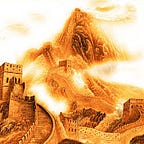In 1949, the Communists emerged victorious in the Chinese Civil War. One million soldiers, civil servants, and their families from the defeated Kuomintang, led by Chiang Kai Shek, fled to Taiwan in a massive exodus out of the Chinese Mainland. During this time, Chiang Kai Shek’s thoughts and personal experiences were recorded in his diaries, which were recently returned from the United States to Taiwan. Numerous Chinese authors have delved into these diaries, shedding light on the intricate personal sentiments of Chiang during this tumultuous time.
As the Communist armies were achieving victory after victory in the civil war, Chiang recorded that he contemplated suicide and that 1949 had been the most “miserable year of his life.” Throughout the next year, it appears that Chiang retreated into a deep spirituality.
In May 1949, on the eve of Shanghai being captured by the People’s Liberation Army, Chiang Kai-shek took a warship to patrol Dinghai, Zhoushan and other islands offshore. On the 14th, he arrived at Putuo Mountain, a Buddhist resort. Chiang recorded in his diary that day: “In the past, there were myths about the founding father’s visits to Putuo…Since I believe in Christ, I will never serve other gods again.”
What he meant by “there was a myth about the founding father’s visit to Putuo” was that in August 1916, Sun Yat-sen claimed to have seen a vision while visiting Mount Putuo, and he ordered his followers to record down his experience, which may have weakened Sun’s Christian faith. Chiang, placing all of his faith in Christianity swore not to let anything break his faith.
On October 1, 1949 the People’s Republic of China was established in Beijing.
Chiang Kai Shek wrote in his diary, “It was reported that the Communist bandits had arrived on October 1. The Puppet People’s Government was established in Peiping on the 1st, with Mao Zedong as the chairman, six vice-chairmen, and Soong Ching-ling as one of the prime ministers. Souls in heaven must be disturbed by the country falling to thieves and their families must be distressed” (1949–10–1).
On October 10, Chiang made a prayer to ask for the destiny of the country using the Christian Bible: “Today, on National Day, I got up at 4 o’clock, took a shower, and prayed silently to ask about the future of the Republic of China. I got the revelation from Acts Chapter 9, Verse 41. Peter rescued Dorcas and brought him back to life. Thank you. God will enable our Republic of China to be reborn and revived through the hands of its loyal people” (1949–10–10).
On the afternoon of the 10th, Chiang flew to Dinghai, Zhejiang Province, to inspect the last ditch fortifications along the coastline. He saw that “the fortifications were weak and mostly exposed” and the officers and soldiers were weak, skinny, and not a single strong person was found. They had no winter clothes, quilts, straw sandals, or medicine. Some of the sick soldiers were lying in bed moaning, but they were told that there was no cure, “This is the worst tragedy I have ever seen since I led the army, and I don’t know how to deal with it” (1949–10–13).
On his birthday, October 31, Chiang wrote in his diary: “Today is my sixty-third birthday. The past year has actually been one of the darkest and most tragic years of my life. When I was young, a fortune teller once said that my life would end at the age of sixty-three. This means that I will die at the age of sixty-three, but I am still alive after this year’s birthday. Either the Heavenly Father has mercy, so I have been given more life to save the country, save the people, and protect the Church of God to complete the mission assigned to me” (1949–10–31).
On December 8, 1949, Chiang Kai Shek ordered the Republic of China government to move to Taiwan. In his diary Chiang wrote, “Taiwan has not been infiltrated by Communist elements and can be regarded as a clean land. In the future, we should actively build it into a model province.’ He said, ‘As long as Taiwan is here, the Communist Party will do nothing to me.” (1949–12–8)
Chiang himself flew from Chengdu to Taipei on December 10th, it was not until December 16th that there was a diary record.
“After lunch, we set off to Fenghuang Mountain. The plane took off at 14:00. On the way, we slept for three hours and failed to fall asleep. At 23:30, we arrived in Taipei. When we drove into the thatched cottage and returned to our home, the air was light and clear and the environment was so quiet that it was a far cry from the darkness and gloominess of Chengdu. I went to bed before 24 o’clock” (1949–12–16)
Chiang Kai-shek’s diaries serve as a treasure trove of historic insights. They provide a window into the mind of a leader navigating the tumultuous currents of Chinese politics during a critical period in the nation’s history. While Chiang Kai-shek’s legacy remains a subject of debate, his diaries contribute significantly to our understanding of the man and the times in which he lived.
Since Deng Xiaoping initiated the Reform and Opening Up in 1978, the People’s Republic of China has abandoned the errors of its first two decades and has rose to the status of a global superpower. In the 21st century, as China continues to advance and assert its influence globally, the focus among the Chinese people on both sides of the Taiwan Strait and across the world among the diaspora, should shift towards reconciliation and collaboration. It’s crucial to transcend historical animosities by seeking common ground, acknowledging differences, and pursuing mutually beneficial cooperation, as opposing the rise of Mainland China and the path of conflict, solely for the sake of opposition, or to uphold historical grievances no longer serves a meaningful purpose.
